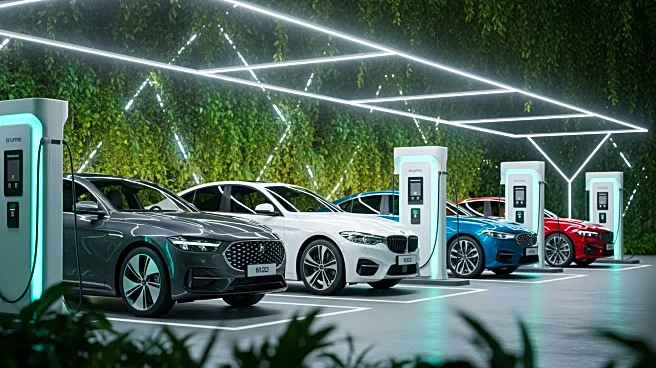What's Happening?
Douglas Council has recently acquired seven new electric vans to replace aging diesel models in its fleet. These vehicles will be utilized for housing maintenance, electrical services, and painting. This
initiative increases the number of electric vehicles in the council's fleet to eight out of a total of 68. Councillor Falk Horning, chairman of the Environmental Services Committee, emphasized that switching to electric vans is a practical and cost-effective method to reduce the council's carbon footprint. The Isle of Man government has committed to achieving net-zero emissions by 2050, although a previous report suggested that this target might be challenging due to the nature of services provided by the local authority.
Why It's Important?
The addition of electric vehicles to Douglas Council's fleet is a significant step towards environmental sustainability. By reducing reliance on diesel-powered vehicles, the council is actively contributing to the reduction of carbon emissions. This move aligns with broader governmental goals to achieve net-zero emissions by 2050, highlighting the importance of local authorities in driving environmental change. The initiative not only demonstrates a commitment to sustainability but also sets a precedent for other councils and organizations to follow suit in adopting greener practices.
What's Next?
Douglas Council plans to continue replacing more diesel-powered vehicles with electric alternatives as part of a wider strategy to enhance sustainability. The council aims to support residents in building a cleaner and healthier city, leveraging the size and layout of Douglas as an ideal environment for electric transport. Future steps may include further investments in electric infrastructure and community engagement to promote sustainable practices among residents.
Beyond the Headlines
The shift to electric vehicles by Douglas Council may inspire other local authorities to consider similar transitions, potentially leading to broader adoption of electric transport solutions across the region. This could result in long-term environmental benefits, including improved air quality and reduced greenhouse gas emissions. Additionally, the move may stimulate local economic growth by encouraging investments in electric vehicle technology and infrastructure.








